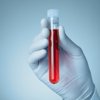Fritextsökning
Artiklar per år
Innehållstyper
-

Thumbs down for lecanemab in the EU – “Very surprised”
The Azheimer's drug lecanemab has received a negative assessment from the European Medicines Agency’s Committee for Medicinal Products for Human Use (CHMP), according to an announcement made by the Agency last week. Bioarctic’s CEO Gunilla Osswald describes the reactions after the announcement as a surprise and disappointment.
-

Healthcare study: Alzheimer’s blood test shows high accuracy
A blood test for identifying Alzheimer’s has now been tested in the general healthcare setting. According to the researchers, the test was 90% accurate in making a diagnosis.
-

”Vi har börjat skala upp så fler ska få tillgång till analyser”
Mångsysslaren Richard Rosenquist Brandell har ofta jobbet i tankarna dygnet runt. Han har ett stort engagemang för precisionsmedicin och blodsjukdomar och har fått några av sina bästa idéer på crosstrainern.
-

Nobel Prize winner Torsten Wiesel turns 100: “Old men like me should use their experience to help the young”
In 1955, a young Torsten Wiesel jumped on a boat to the US and embarked on a fabulous career as a neuroscientist, crowned with a Nobel Prize for his work. Now 100 years old, he looks back on an intense life and his upbringing in Stockholm, Sweden, which shaped his desire to help the vulnerable in society.
-

Innovative start-up helps doctors, scientists and industry balance coagulation risks
For many doctors caring for seriously ill patients, for example, in stroke units and cancer wards, maintaining the life-saving balance between bleeding and thrombosis is an ongoing challenge. In the late 1980s, scientists at Maastricht University in the Netherlands developed an innovative method, the thrombin generation assay (TGA), which provides a complete overview of a physiological process crucial for maintaining normal haemostasis.
-

“Conducting research at universities is becoming more and more like working at a research hotel”
The government wants Swedish research to focus on excellence and innovation, but can the two be combined? Life Science Sweden talks to Anna Falk, a professor at Lund University, about research policy, the constant hunt for funding in academia and what constitutes ‘fine research’.
-

Samuel Lagercrantz: “Companies that do this successfully will take the lead”
The development of new medicines and medical technologies should not focus too narrowly on prolonging life. It is equally important to develop treatments that relieve pain or eliminate painful symptoms, writes Samuel Lagercrantz in an editorial.
-

Bayer has cut 1,500 roles – so far
German chemical and pharmaceutical group Bayer cut more than 1,500 roles in the first quarter alone– and most of them were management positions.
-

Total pipeline of pharmaceutical companies reaches a record high – 22,921 medicines are currently being developed
Despite the difficult economic times, pharmaceutical companies have never developed as many new drugs as now.
-

Carl Borrebaeck – professor and serial entrepreneur with a taste for speed
Award-winning cancer researcher, the founder of many listed companies, and constantly in the academic and commercial spotlight for decades. However, Carl Borrebaeck, Professor of Immunotechnology at Lund, is not yet satisfied. “We have a new, potentially super exciting project in the pipeline,” he says.
-

Astra Zeneca's Covid-19 vaccine Vaxzevria is being withdrawn worldwide
AstraZeneca initiates a worldwide withdrawal of its Covid vaccine Vaxzevria. The measure is taken just months after the company admitted the vaccine can cause a rare and dangerous side effect, but AstraZeneca claims that the decision is purely commercial.
-

Nytt namn till Pixelgens vetenskapliga råd
Pixelgen har tillsatt Mostafa Ronaghi till sitt vetenskapliga råd.
-

KI’s freezer fiasco investigated: A chain of failures
A chain of combined technical and organisational shortcomings caused the freezer breakdown at the Karolinska Institute during the Christmas holidays, destroying more than 47,000 samples. This was the conclusion of an internal investigation.
-

Nocebo – the evil twin that makes you feel worse
The placebo effect is well known in healthcare, but not so its opposite: nocebo. “The effect is small, but it can have major repercussions,” says Uppsala researcher Charlotte Blease, co-author of a book on the phenomenon.
-

The Covid pandemic accelerated the development of cancer vaccine
The Covid pandemic gave a major boost to the vaccine field. The Danish biotech company Expres2ion Biotechnologies, which is developing a vaccine against breast cancer, testifies to this.
-

Study: Popular diabetes treatment is not associated with thyroid cancer
Concerns raised about an association between GLP-1 analogues, used to treat diabetes and obesity, and an increased risk of thyroid cancer are not supported by an extensive Scandinavian study.
-

Beta-blockers are often given unnecessarily, a study finds – “This will affect future practice”
Patients who have suffered a minor heart attack do not benefit from beta-blockers, according to a major new study that may change guidelines for cardiac care.
-

Settlement of cancer allegations against blockbuster drug
French pharmaceutical company Sanofi has reached a principal agreement in the US on around 4,000 of the cases in which its now withdrawn blockbuster heartburn drug Zantac allegedly had caused cancer.
-

The life science strategy – what the industry wants
The process of updating the national life science strategy has begun at the government’s life science office. According to industry stakeholders, Sweden’s competitiveness, the accessibility of health data and the integration of innovation in healthcare are some of the points that are essential to review.
-

”We need compatibility“
Penilla Gunther, founder of Fokus Patient and chair of the European Patient Safety Foundation, hopes that the forthcoming life science strategy will focus on efficient and secure management of patient data and equal access to medicines.
-

Anna Törner: ”Orphan Designation – the "petite robe noire" of drug development”
It is easy to cling to various regulatory incentives, like orphan designation, and other expedited pathways, without understanding what they truly mean or whether they are indeed right (or wrong) for the current project, Anna Törner writes in a column.
-

Specific proposals and targets top the universities’ desired priorities
What are the universities’ expectations for the update of the national life science strategy? Life Science Sweden posed the question to representatives from Karolinska Institutet and Sahlgrenska Academy.
-

“Life science is important on a personal level”
From the High Coast to the Government Offices. Jeanette Edblad is a native of Ångermanland, and since September last year, she has been Head and Coordinator of the Government’s Life Science Office.
-

“What is important is to create an overview and understanding from different perspectives”
Scientist Jochen Schwenk analyses blood proteins using proteomics to improve our understanding of disease and health. This year, he is moderating the Lab & Diagnostics of the Future event.